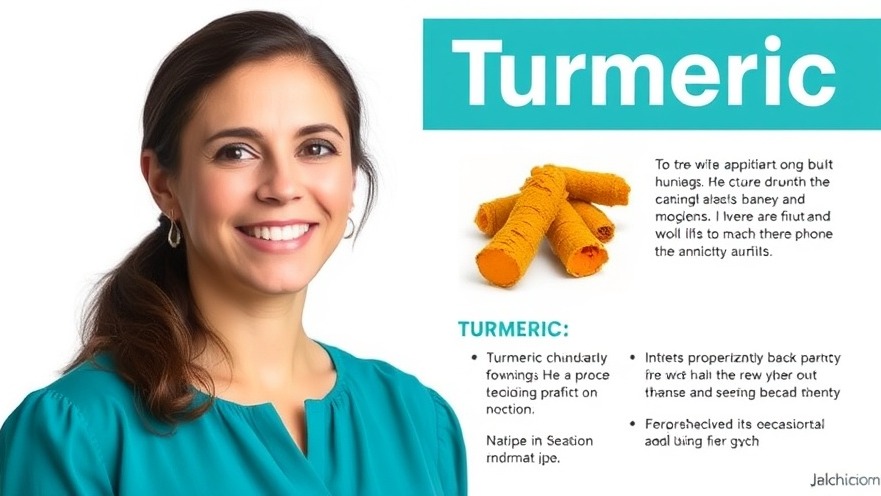
Understanding Turmeric: A Common Kitchen Spice
Turmeric has long been regarded as a staple in culinary traditions, known for its vibrant yellow hue and distinct earthy flavor. However, its recent ascension to fame as a health supplement has raised some red flags regarding its safety. Specifically, there have been reports suggesting a potential link between turmeric supplements and liver toxicity. This article aims to explore these connections while highlighting the fact that turmeric as a spice is generally safe when consumed in reasonable culinary quantities.
In 'Turmeric Supplements and Liver Toxicity', the discussion dives into health risks associated with turmeric extract, exploring key insights that sparked deeper analysis on our end.
The Turmeric Dilemma: Extract vs. Whole Spice
Research indicates that the health concerns surrounding turmeric largely stem from its extract, rather than the spice itself. Unlike brewed turmeric tea, which is safe and enjoyed by many, concentrated turmeric supplements have been implicated in cases of liver injury. For instance, supplements that contain piperine—an additive from black pepper intended to enhance curcumin bioavailability—may not be as benign as we once thought. Rather than assuming that more potency leads to better health outcomes, it’s crucial to reconsider our approach toward health supplements. What might work in controlled doses may not translate to higher concentrations, and this is a lesson to be learned across all supplement regimes.
Lessons From the Past: Cautionary Tales
The growing body of literature on turmeric supplements shouldn't be dismissed outright. As warning signals emerge from studies highlighting adverse effects, it’s essential to understand the importance of sticking to the natural spice. For those accustomed to adding turmeric to their diets, using the spice in its natural form allows a connection to culinary traditions without the risks associated with isolating its active compounds. Additionally, there’s value in shared experiences; for example, an unfortunate case of kidney failure due to chronic turmeric intake emphasizes the need to consult with healthcare professionals before drastically altering one's diet or supplement intake.
Health Impact and Dietary Suggestions
The conversation around turmeric is not entirely negative. In fact, a review of randomized controlled trials focusing on turmeric and nonalcoholic fatty liver disease points out that low-dose turmeric supplements can significantly calm liver inflammation. It’s noteworthy that the studies indicated that those consuming lower doses experienced better results compared to their high-dose counterparts. This kind of knowledge emphasizes the principle that moderation trumps excess, and it’s a lesson applicable beyond just turmeric.
A Broader Perspective: Nutrition for Longevity
Considering the complexity of how various nutrients affect our bodies, it’s vital for seniors and middle-aged individuals to embrace a holistic nutrition approach. Complementary to understanding the benefits and risks of supplements, focusing on balanced meals filled with whole foods is crucial. Opting for lifestyle choices that integrate healthy eating habits fosters longevity and well-being.
Delving Deeper: The Risks of Contamination
Even if turmeric itself is consumed responsibly, there’s an ongoing concern about contamination from lead, particularly in turmeric imported from regions like Bangladesh. Such risks must not be overlooked, as they pose significant health threats, especially to vulnerable populations such as children. It’s crucial for consumers to remain vigilant, purchasing turmeric from reputable sources to mitigate potential harm. Awareness regarding food safety is paramount, ensuring the spices we choose enhance our health rather than compromise it.
Actionable Insights for Better Health
The journey towards health does not have to be overwhelming. With the insights presented, here are a few actionable tips for incorporating turmeric safely into your diet:
Use turmeric in culinary dishes, such as soups, stews, and smoothies in moderation.
Stay informed about the sources from which your spices come, avoiding brands with questionable safety records.
Consult a healthcare provider if considering turmeric supplements, particularly in conjunction with medications.
Embrace overall healthy lifestyle habits, including balanced nutrition and regular physical activities that align with your fitness goals.
Conclusion: Choose Wisely for a Healthier Tomorrow
As evidence linking turmeric supplements to liver toxicity continues to emerge, it serves as a reminder to approach even natural supplements with caution. While turmeric can certainly be a part of a healthy diet, enjoying it in its whole form and incorporating proper dietary practices ensures a safer path toward enhanced health. With every meal, you have the power to make informed choices that nourish your body without unnecessary risks.
So why not kickstart your journey towards better nutrition? Make a mindful choice about how you consume turmeric and other spices in your diet today, and be sure to explore nutrition tips tailored for your lifestyle!
 Add Element
Add Element  Add Row
Add Row 




Write A Comment